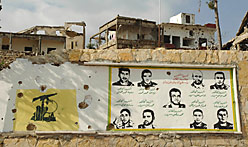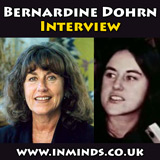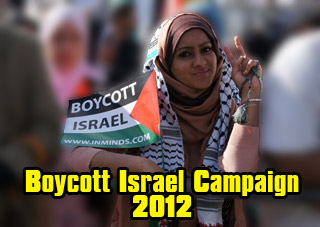
 Innovative Minds © 2014. All Rights Reserved. www.inminds.co.uk | |
|
[Lebanon] In south Lebanon, resistance from cradle to graveScott Peterson, Staff writer of The Christian Science Monitor One family's allegiance to Hizbullah reveals much about the group's support and how it draws fighters. On the leeward side of Ait al-Shaab, a village in south Lebanon, the war between Hizbullah and Israel caused many sacrifices. Months later, both tears and triumph are plentiful.
"They became Hizbullah in their blood," says one sister. "Every human loves freedom, and the freedom has come through Hizbullah."
Even after the Shiite "Party of God" sparked a war that killed three of their loved ones and battered most every house in the village, one family's steadfast allegiance to Hizbullah reveals much about the group's bedrock support and how it draws more fighters. "You can't describe [the level of our commitment]," says the surviving mother of 13, dressed head to toe in layers of black. "After God, it is resistance." Under their modest roof, nine children are boys, five of them fighting age. A poster of Hizbullah leader Sheikh Hassan Nasrallah is taped inside the front door of the cinder-block house, a minute's walk to tobacco fields and citrus groves. One son, a Hizbullah fighter, was pierced by shrapnel through the right hand. The grandparents, too weak to flee the Israeli shelling, were killed in a direct hit to their house.  Martyrs wall: Images of nine 'martyrs' from Hizbullah who were killed in the war with Israel are displayed on a wall in the village of Ait al-Shaab in south Lebanon. The father, who refused to leave his parents alone, was struck with shrapnel and lived. But he died later, the family says, when Israeli jets hit the ambulance as it raced with him to the hospital. Israeli forces targeted ambulances and aid convoys numerous times in the war. "Naturally, we love the resistance," says one son. "We predicted there would be a war, and always our salvation was Hizbullah. We count on them to save us; since childhood it is in our minds." But he didn't join the Hizbullah fighters like his other brothers. And he had a hard time convincing his father â before his death â that he should avoid the front and help with food and evacuating the women. The father wanted all five sons to join the war. The younger brother, 20, relished his first battle "One hundred percent it felt very, very good." He was just 14 or 15 when he "first began to think about the resistance, to understand it," he says. At 17, "the idea was complete in my mind. I felt I must be there and join [Hizbullah]." In the war, he didn't become a "martyr," like his friend, whose image can be found on what locals call the "hero's wall." Portraits of the village's nine most recent martyrs mark the wall in the village's central square. "When I see those portraits, I wish I could be there," says the younger brother.
One brother from this family and a cousin were forced to join the SLA. The brother was taken away as a recruit in 1993 by the SLA directly from high school where he was taking an exam to enter college. In less than a month he escaped: angry and ready to join Hizbullah.
"As long as there is an enemy, the idea of martyrdom is there, like Imam Hussein," says the older one. That enemy has been Israel and the proxy South Lebanon Army (SLA) militia that it created during its 18-year occupation of south Lebanon that ended in 2000. One brother from this family and a cousin were forced to join the SLA. The brother was taken away as a recruit in 1993 by the SLA directly from high school where he was taking an exam to enter college. In less than a month he escaped: angry and ready to join Hizbullah. "They became Hizbullah in their blood," says one sister. "Every human loves freedom, and the freedom has come through Hizbullah." Today, the families of martyrs receive their dead fighter's salary and $10,000 to pay rent while houses are rebuilt (often with money from Iran). That does not make the cycle of war and rebirth less of an effort or less painful."What we lived through and felt because of the war, felt like we were living in Karbala," says another daughter, referring to the city where Imam Hussein was killed by the armies of a Sunni caliph. The family matriarch laughs when asked if her aim has been to raise martyrs. But her daughter replies, "Of course I would feel proud to marry and have children, if they die for their village, their family, their beliefs; I would feel proud." Source: http://www.csmonitor.com/2007/0607/p14s01-wome.html Related ArticlesAlso Of InterestPage URL: http://www.inminds.co.uk/article.php?id=10209
|
|
Support Us
If you agree with our work then please support us.Campaigns INMINDS Facebook Live Feed Latest Video's
INMINDS Twitter Feed Tweets by @InmindsComFeatured Video's
You need Flash player 8+ and JavaScript enabled to view this video.
[all videos (over 200)..] Featured MP3 Podcast  "You cannot simplify the question of violence.. You look at human history - the American revolution, the civil war, the end of slavery in the United States, the African National Congress, the end of colonialism - by and large these were some combination of popular social uprisings and social movements and non-violent protests AND armed resistance. Now that doesn't mean I'm advocating for any armed action today, I'm not. I'm committed to finding ways of acting and speaking and making people laugh and doing art and disrupting the war machine in other ways, but I think focusing on violence when we have the comfort of being protected by mass of armed violence is not non-violence at all.. if you are pointing to the mass of violence and who's doing the mass of violence in the world today, you have to look to state violence - that's people bombing whole cities from the air.. " A founder of the Weather Underground, a revolutionary group that waged war against the US government in the 70s in response to the Vietnam War. Interview, Radio Neatherlands (TSWI) 30 June 2007 [12min / 6Mb] [all podcasts..] Newsletter Feedback |
 |
 |













































